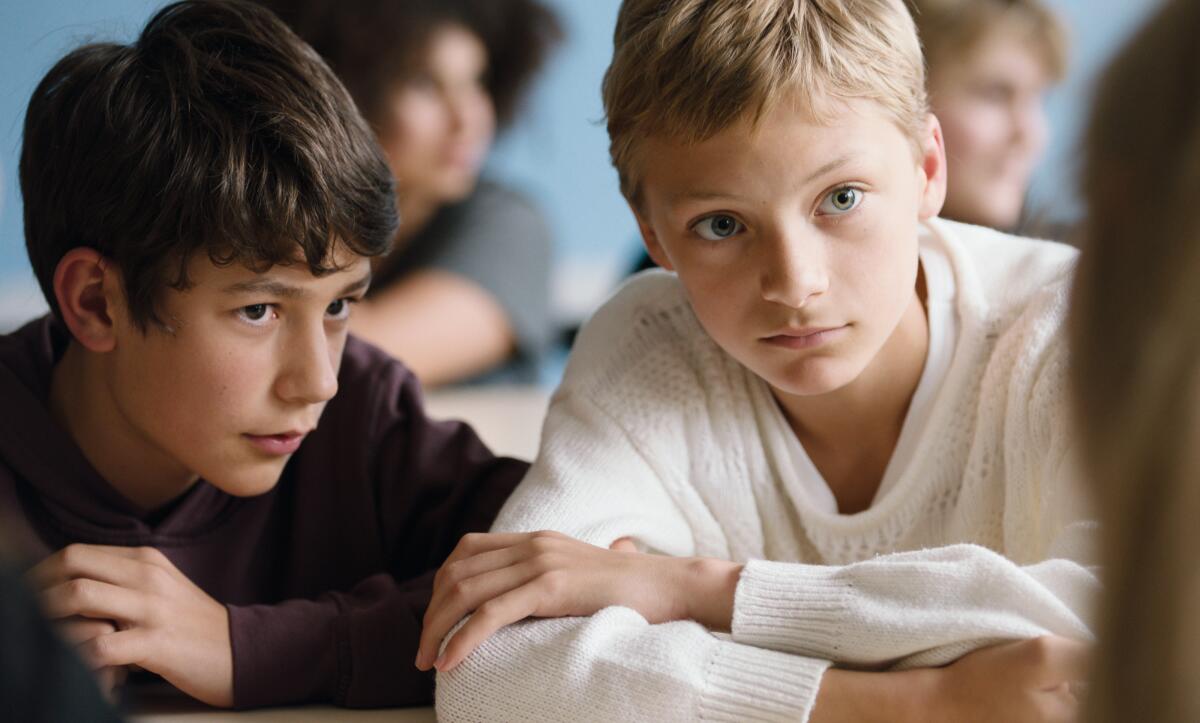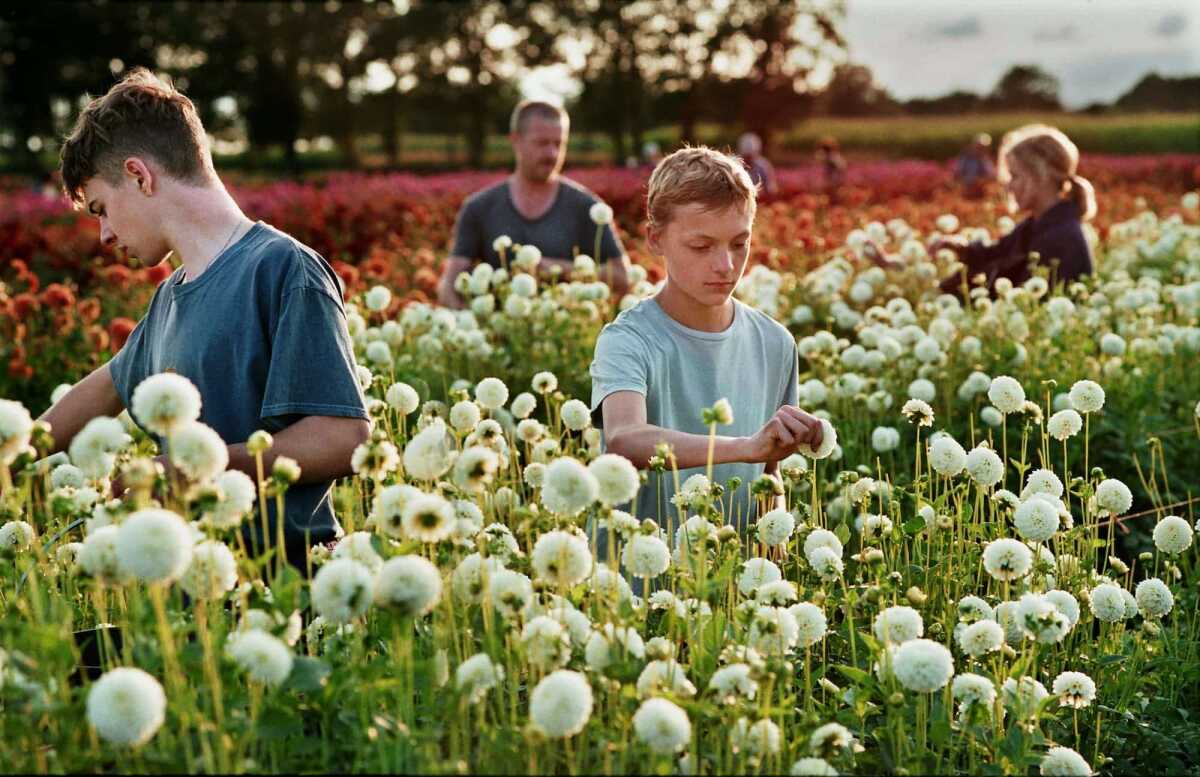Review: Bring tissues to the Oscar-nominated ‘Close,’ but also a little skepticism

- Share via
“Close” badly wants your tears and, on occasion, it earns them. A flawlessly acted, precision-tooled heartbreaker from 31-year-old Belgian writer-director Lukas Dhont, it tells an Edenic love story, conjuring a rapturous state of intimacy that gives way to a tragic fall from grace. What gives the movie its faint whisper of the taboo — a taboo that it proceeds to dismantle — is that the love story here happens to be between two 13-year-old boys, Léo (Eden Dambrine) and Rémi (Gustav De Waele). They’re longtime best friends who have grown as close as brothers, with none of the usual hang-ups about physical affection between boys. Here, even a head resting on a friend’s shoulder expresses a casual but powerful sense of mutual belonging.
Léo and Rémi are inseparable, in part because they’ve both been raised in gorgeous pastoral isolation. Léo’s parents are flower farmers, cueing many lovely shots of the boys running and riding their bicycles past colorful fields. (For better or worse, Dhont and his cinematographer, Frank van den Eeden, seem incapable of composing an unlovely shot.) The camera speeds alongside the boys, keeping pace with them and, it seems, sharing in their joyous sense of abandon. But then it will come to a gentle standstill, tenderly observing as Rémi’s mother, Sophie (Émilie Dequenne), laughs and tumbles with the boys in the grass, or as the two boys share a bed in Rémi’s room, its suggestively dark red walls enfolding them like a cocoon.
For your safety
The Times is committed to reviewing theatrical film releases during the COVID-19 pandemic. Because moviegoing carries risks during this time, we remind readers to follow health and safety guidelines as outlined by the CDC and local health officials.
Is there an element of physical attraction at play here? Dhont doesn’t say, and his silence raises another question: Why does it matter? The best thing about “Close,” an Oscar nominee for international feature and a major prizewinner at last year’s Cannes Film Festival, is its firm but gentle destigmatization of boyhood intimacy. Whether Léo and Rémi are going through an unusually intense phase of their friendship or experiencing the early adolescent stirrings of sexual desire — two equally plausible and hardly mutually exclusive possibilities — their bond deserves time, space and understanding, not judgment.
Their families, to their credit, provide them with that understanding. As in “Girl,” his tense, troubling drama about a transgender ballet dancer, Dhont expresses a near-mystical belief in the decency and supportiveness of parents. As a counterbalance, he also understands that children and teenagers are capable of remarkable cruelty, which is where Léo and Rémi’s troubles begin. There’s a telling overhead shot of the boys arriving for their first day of school and immediately getting lost in the crowd; they’re no longer alone, and their bond will never be the same. Before long their casual tenderness draws unwelcome attention from their classmates, some of whom make giggling insinuations (“Are you together?”) and some of whom assault Léo with homophobic slurs.

While Rémi seems generally unfazed, these attacks have a profound effect on Léo, who bristles, panics and begins to pull away from his best friend — a process of rejection that Dambrine, whose sensitive pout and penetrating stare at times recall a young Jude Law, makes legible at every stage. He gives a remarkable performance, as persuasive in its rough-and-tumble physicality as in its delicately understated emotions. As Léo withholds affection and attention from Rémi and eventually begins avoiding him altogether, Dambrine projects a complicated swirl of callousness, vulnerability and regret. And as played by De Waele, Rémi, though less front and center, registers a heartrending incomprehension at Léo’s betrayal.
The two boys may love each other equally, but Rémi’s need is clearly far greater — perhaps because he has no siblings (unlike Léo, who has an older brother he’s also close to), and perhaps for other reasons that Dhont leaves unspoken. And he leaves a great deal unspoken here. “Close” is about a lot of things — the joy of friendship, the heartache of separation and the oppressiveness of masculine stereotypes — but what it’s mostly about is the nature of its characters’ silence. And that silence isn’t always a bad thing: In the movie’s radiant opening passages, Léo and Rémi have little need for words, so palpable is their contentment in each other’s company.
But then in its second half, after the boys’ connection is sharply ruptured, the movie engages an infinitely tougher kind of silence: the fumbling inarticulateness of boys who, even if they could make sense of their emotions, would be hard-pressed to know how to talk about them. The degree to which Léo is stifling his feelings becomes most apparent when he joins an ice hockey team — an athletic pursuit that serves as both a public assertion of conventional masculinity and an opportunity to make new friends. But as the story keeps cutting away to shots of Léo darting across the rink, his movements lightning-swift and his face twisted in concentration, he seems more alone than ever — as if he were trying, through sheer physical force, to exorcise the most private and personal of demons.
For much of “Close,” Dhont’s restraint dovetails artfully with his characters’ repression, though as it progresses, the movie increasingly seems to make a fetish of its own subtlety. At roughly the midway point, Dhont unleashes a narrative development that, while believable enough on its own terms, feels more like an evasion than an exploration of the story’s true emotional potential. That coyness persists through the second half, with a series of suspended conversations and delayed reckonings that strain for honesty, only to bog down in the familiar language of art-house mannerism.
Dhont, a filmmaker of considerable and undeniable talent, has a weakness for telegraphing his own boundless sensitivity. He’s also still learning to braid his competing instincts toward realism and melodrama, as if he were both determined to go for the jugular and a bit embarrassed by his own determination. As good as his actors are — especially the wonderful Dequenne, whose Sophie quietly seeks to repair the boys’ broken bond — they cannot conceal the calculation inherent in this story’s design. Nor can they quite overcome the disconnect between the glossy, self-admiring visual beauty of “Close” and the stormier, uglier emotional depths it purports to uncover.
‘Close’
In French and Dutch dialogue with English subtitles
Rated: PG-13, for thematic material and brief strong language
Running time: 1 hour, 43 minutes
Playing: Starts Jan. 27 at AMC the Grove 14, Los Angeles; AMC Century City 15
More to Read
Only good movies
Get the Indie Focus newsletter, Mark Olsen's weekly guide to the world of cinema.
You may occasionally receive promotional content from the Los Angeles Times.











